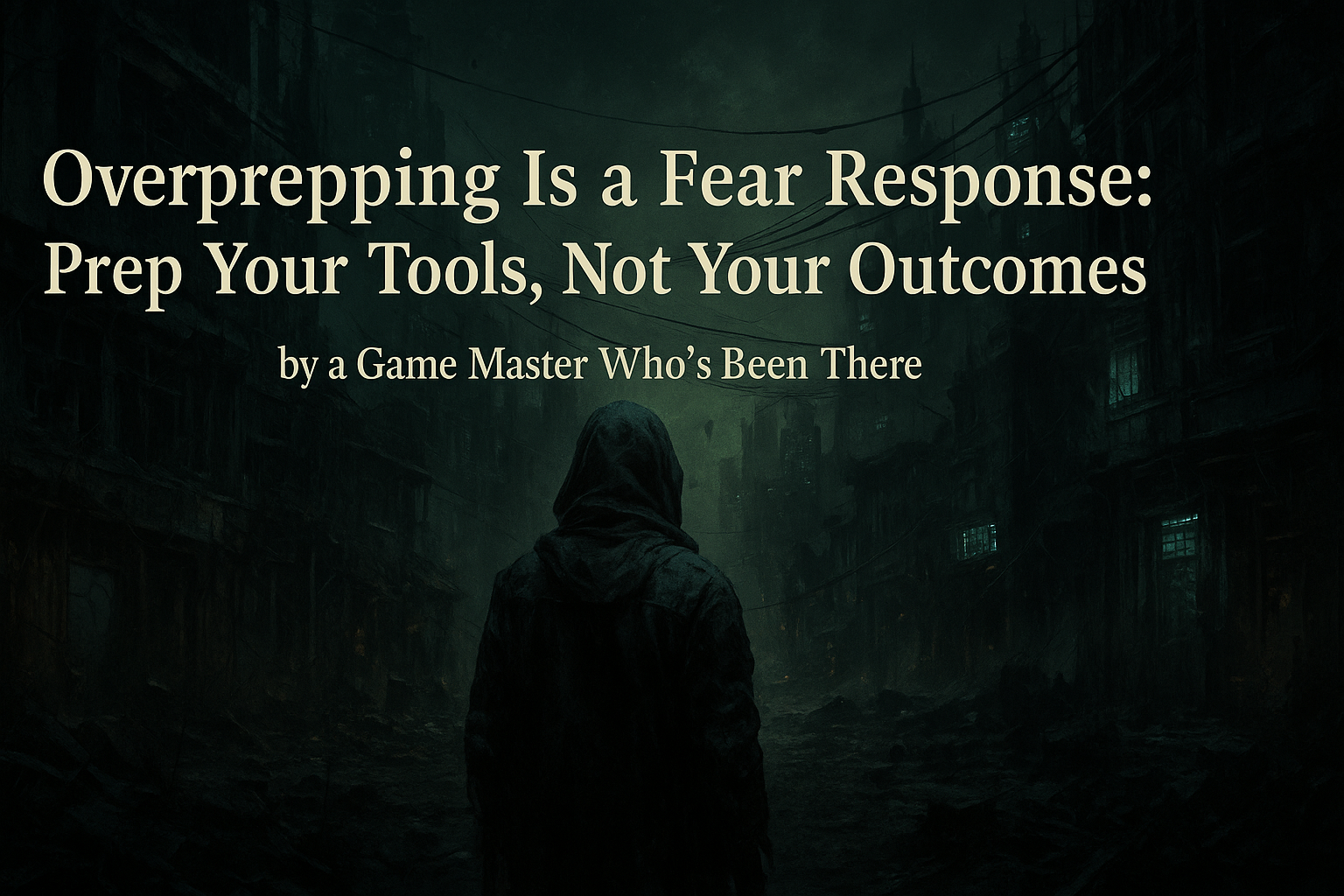Over Prepping is a Fear Response
Let’s talk about a common GM habit that starts with good intentions and ends in burnout: overprepping.
You know the drill. You sit down to get ready for your session, thinking you’ll sketch out the dungeon, maybe name a few NPCs. Three hours later you’ve got regional histories, detailed floor plans, and you’re writing dialogue for a conversation your players might never have. Why? Because some part of you thinks if I don’t plan everything, I won’t be ready. That’s not prep. That’s fear. And it’s robbing you of the actual power of improvisation and play.
Let’s flip the script.
Prep Is About Knowing What’s There, Not What Happens
Your job isn’t to predict outcomes. Your job is to know what’s possible.
Think of yourself less like an author scripting a novel and more like a stage manager setting the scene. You build the world—the village, the factions, the weird glowing fungus in the canyon—and then you let your players interact with it however they want. When they poke it, it wiggles. When they hit it, it breaks. When they try to talk to it, well… that’s when you improvise.
But to do that well, you don’t need to know what your players will do. You just need to know what’s there to be done to.
“But If I Don’t Prep Outcomes, I’ll Freeze!”
Here’s the thing: that fear is real. Every GM has had that deer-in-the-headlights moment where the players say, “We ignore the plot hook and go talk to the creepy guy at the lake,” and you panic because you didn’t plan for that. The temptation is to try to map every possible choice ahead of time. But you can’t. And you shouldn’t.
Instead, prep like a world-builder, not a playwright.
Ask yourself:
- Who is this creepy lake guy?
- What does he want?
- What does he know?
- What resources does he have?
Now you don’t need a script. You’ve got a character who can respond logically in the moment. You’ve prepped your tools—your knowledge of who and what exists—not your outcomes.
Tools to Prep (That Aren’t Plot)
- Maps as Relationship Webs – Don’t just draw a town map. Know who’s connected to whom. Who’s in debt. Who’s secretly a werewolf. Those dynamics will matter no matter how your players engage.
- Clock the Pressures – What systems are in motion regardless of the PCs? The forest is growing, the guards are corrupt, the relic is leaking magic into the groundwater. These give your world momentum and tension without needing a linear plot.
- Theme and Tone Anchors – Know the emotional and narrative flavor of your world. If you want dread, prep atmospheric details. If you want swashbuckling, prep opportunities for dramatic flair. That way, your responses feel cohesive even off-the-cuff.
- Tables and Prompts – Random encounter tables, reaction rolls, flash NPC generators. These aren’t just filler—they’re lifelines when the game swerves.
Embrace the Improvisation
Players are chaos gremlins, and that’s what makes TTRPGs magic. You don’t need to control them. You need to be ready for them. And the best way to be ready is to stop predicting outcomes and start preparing foundations.
It’s the difference between building a railroad and building a city. A railroad can only go one way. A city? You can explore it, get lost in it, blow it up, rebuild it, take over the sewer system, or open a bakery. That’s the kind of world your players want to live in.
So prep your tools. Know your world. And trust yourself to respond when it all goes off the rails—because it will, and that’s where the real fun begins.
Give Yourself Grace
No matter how well you prep, your players are going to throw you curveballs. That’s part of the magic—and the chaos—of the game. You’re not a mind reader, and you don’t have to be. So when things go sideways and you don’t have the perfect response locked and loaded, breathe. It’s okay to stumble. Your players aren’t expecting perfection—they’re showing up to have fun with you, not judge your reaction speed.
Take a break if you need one. Step away for five minutes to collect your thoughts or skim a rule. There’s no shame in saying, “You got me—I didn’t expect that. Mind if we pause here and I prep something cool for next time?” Or even better: “I’m not sure how to handle that—what do you all think?” You don’t have to carry the whole story on your back. This is a shared table, and sometimes the best moments come from letting your players help carry the weight.




Comments